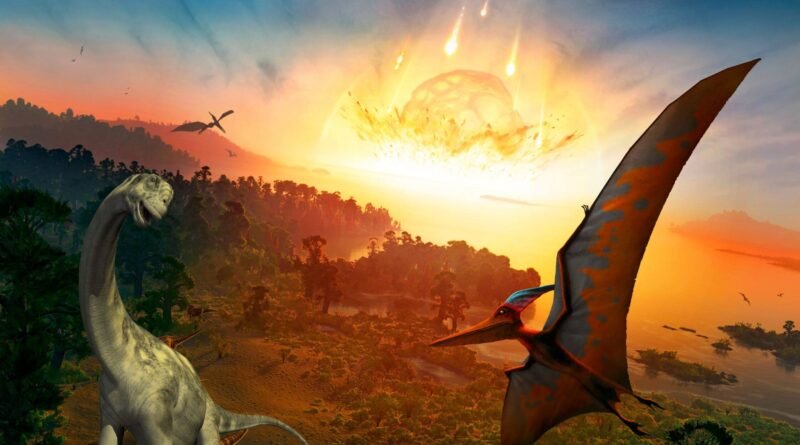Why dinosaur extinction was predictable even before the asteroid crash
The non-avian dinosaurs were extinct 66 million years ago, and the remains are unresolved because of the coarseness of the fossil records. The dinosaurs suddenly became extinct after the asteroid hit, and it is the best. Accepted hypothesis, and it is a much-debated topic whether the dinosaurs were declining before the asteroid hit or not. The influence of ecological and physical factors also impacted the decline of dinosaurs. The extinction risk is also related to species age, lack of evolutionary novelty, and adaptation to changing environments.
Sudden demise of dinosaurs by asteroid strike
Most scientists agree on why dinosaur extinction happened, that intense volcanic activity wiped out the dinosaurs along with the asteroid impact. However, there is a constant debate whether the dinosaurs were flourishing before the asteroid impact or started to decline due to climate changes. Some researchers have used fossil records and Mathematical predictions to show that the dinosaurs were already on the verge of decline.
On the other hand, according to the new analysis, the changing environment, and the strong dinosaur species distribution around North America, researchers have shown that dinosaurs were not declining before the asteroid attack. They found the pattern of the declining dinosaur towards the end of the Cretaceous period. It supports the idea that the dinosaurs were more diverse even several million years before their extinction. Towards the end of the Cretaceous period, when the herbivorous dinosaurs were declining, it was not triggered by the asteroid strike.
However, researchers in Spain are not convinced with this particular statement and still wonder why dinosaur extinction would not have been possible if the asteroid had not suddenly struck. Since it’s an underlying fact, without the fossil record, it is incomplete. Around 60% of the fossils are not recorded in North America. Cataracts, slipped discs, epidemics, glandular problems, and loss of sex drive have also been proposed as various reasons for the extinction of 66 million years ago.
Diseases in dinosaurs that led to their extinction
Even though asteroid impact is quite famous and the effect of volcanic eruption, changes in the sea level, and climate fluctuations remain a debated topic for the extinction of dinosaurs, some starting accidents and several diseases also led to the demise of dinosaurs. Some surveys have even shown fractures, infection; arthritis that are visible in the fossils. Breaking bones and other pathology have dropped off the dinosaurs of the Mesozoic age. Many of the diseases that afflicted the dinosaurs are somewhat associated with their extinction.
Dinosaurs suffered from a variety of ailments. They were scratched by parasites, endured bone infections, and even developed skin cancer. During the Triassic and Cretaceous periods, no sign of pathologies of dinosaurs showed their extinction. However, some seagoing lizards disappeared during this time. A negative net diversification rate translates into a decline in species diversity. A progressive decline of dinosaurs was seen towards the end of the Cretaceous period.
Paleontologists and researchers are constantly striving to detect whether the asteroid impact suddenly made the dinosaurs go extinct or they were declining before the attack. It is open to a scientific debate that the asteroid impact was the main culprit. However, volcanic eruptions and large-scale climate change were also responsible for the sudden demise of the species. Although the number of dinosaur species was declining, the sudden catastrophic event created unfavorable changes to the environment, which the dinosaurs and Cretaceous period creatures could not adapt to. Thus, they became extinct. However, even today research continues to be conducted upon their species for their distinctive features. Surprisingly, many interesting facts have been discovered about them.
What caused the extinction of dinosaurs
The dinosaurs first appeared approximately 66 million years ago. Their extinction is still a mystery though. Some researchers think some climatic change, diseases, geologic events, asteroid strikes impacted the extinction. The leading theories of where did all the dinosaurs go are as follows:
- A big asteroid crashed into earth causing climatic changes that the dinosaurs could not survive.
- Ash and gas spewing from the volcanos that suffocated the dinosaurs.
- Some major diseases like bone infections and cancer wiped out the entire population.
- Imbalances in the food chain led to the starvation of the dinosaurs.
When the asteroid hit the earth near the Gulf of Mexico, it blocked out sunlight for a long time. Eventually, a series of deadly events occurred. The plant-eaters and many other species died. Paleontologists have not been able to find out the skeleton of the dinosaurs who were impacted during this event.
The bottom line
So, why dinosaur extinction? The theory of dinosaur extinction is a topic of much debate and controversy. Many scientists and researchers support that the dinosaurs became extinct due to an asteroid strike. However, looking at the fact that many diseases also prevailed can lead to the extinction of these species.
So, if you are interested to know more about them, do not hesitate to conduct further research. We promise; they are likely to help you like no other. Stay tuned for more with us!





